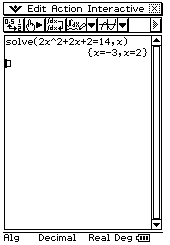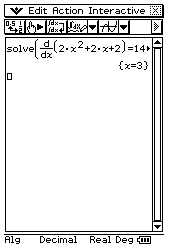Last year I was struggling with using laptops in the mathematics classroom with students of significant disadvantage. I had thousands of dollars of equipment and yet felt unable to utilise them in a way that raised performance in my classroom. Use of technology outside of CAS calculators was near nil. We called in our local laptop reseller to help. It was a big surprise to hear from the reseller that utilisation of laptops in 1-1 laptop mathematics classrooms was around 5%. Schools hadn’t done much more than load textbooks, do the occasional assignment and play with math games.
This was a defining moment in the use of laptops at our school and freed the math department to think outside the box. These machines were unlikely to assist us in solving problems in a mathematics classroom. It wasn’t going to revolutionise our teaching, but with such a high level of available resourcing we realised it may have the potential to revolutionise learning.
The first thing we did was look at problems of the low socioeconomic student, resourcing, organisation, attendance, engagement, completion of work (in and outside the classroom), skill and knowledge deviation/development. This is where lights turned on and we started towards real reform of learning.
Our reseller jump started our thinking by showing us an application that filled a need for a learning management system at the school. Interactive whiteboards were creating masses of information that students wanted and digital resources were becoming more prevalent. We needed a platform to distribute electronic information to students in real time. Something cloud based was our preference as we did not have the resources to maintain something onsite. It needed to be something reliable and already tested, we didn’t want to be doing and paying for cutting edge research. Edmodo, the software suggested by the reseller, filled a need.
We needed to seek ways to increase our influence outside of the classroom to better utilise classroom time. School grades were posted online allowing students access to their progress. Practice tests and screencasts of key lessons were posted online for students to use as revision for tests. Students started to post question online for answering by the teacher or peers – more importantly students started responding to posts before I had a chance to.
Last Friday I sat with a disengaged student learning BIMDAS. I noticed that although he could identify what to do, by the time the student reached the part of the sum to work with, he had forgotten what he had to do. A simple idea was to underline the next operation to be performed. This changed his demeanour and he engaged with me as his teacher, working through a page of sums. A new (although I imagine obvious to many) teaching method though was not the main outcome from this incident.
By far the most unexpected outcome of our IT journey is watching the doors between classrooms open, with math teachers in the school sharing ideas. Ideas such as the underlining during BIMDAS are starting to pollinate between teachers – teachers that found it hard to meet due to timetabling were now able to share and comment on resources. Ideas are being recorded and are retained for use in following years. Although the laptops were not engaging students, the idea of using them more effectively was solving some of the problems that I had expected that laptops would resolve directly.
This idea of technology helping engage students goes beyond direct use of laptops. The online environment itself was proving a motivating factor with the year eights. They could see that we were making an effort to extend into their world, where physical appearance, socioeconomic status, age, gender, religion were insignificant factors to interaction. Where rapport is so important with low socioeconomic students, any connection we can make between their world and ours is beneficial. It helped that edmodo had adopted an interface very much like that of Facebook, a generally banned interface in the government school system.
Now that we had a system that can store boardwork and assist absentee students work whilst outside school (such as those doing VET courses) we had the potential to ameliorate some of difficulties of absentee students and students with academic difficulties. It removed some of the excuses and put more of the onus of responsibility back onto the student to perform.
It is only a beginning but one that is exciting. We know IT has been traditionally an underperformer, but in this instance I am excited by the response both by students and teachers. We will need to continue examining how the system is working going forward and drive towards more tailored resources for students.

 Go keyboard -> 2D -> Calc ->
Go keyboard -> 2D -> Calc ->




